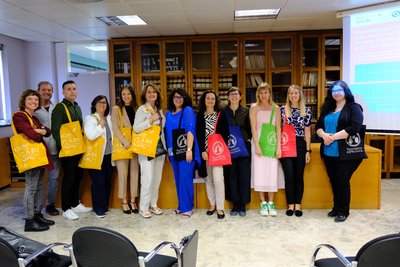28 May 2025
International Conference at the University of Valencia with the WTI’s Gender Team
The WTI team was honored to be hosted by Professor Rosario Espinosa Calabuig, an esteemed expert in Private International Law from the Department of International Law at the University of Valencia. The international conference focused on Intersectionality, Human Rights Justification, and Civil Society Engagement, with insightful presentations that reinforced the idea that human rights exist to protect dignity, freedom, and equality for all.
Professors Elisa Fornale (WTI, University of Bern) and Federica Cristani (Institute of International Relations, Prague) introduced the HRJust project, which aims to enhance human rights protections through inclusive civil society engagement. Intersectionality, a key component of this work and highlights how overlapping social categories—such as race, gender, and class—create complex systems of discrimination. Applying this perspective helps make human rights advocacy more inclusive and effective in protecting marginalized groups.
Professor Espinosa Calabuig focused on gender stereotypes, which contribute to gender-based violence and deeply harm victims. Women facing multiple forms of discrimination are particularly vulnerable, especially in cases involving custody rights and child abduction, which pose serious dangers for those fleeing abuse. Gender-based violence presents both visible and hidden challenges—while proving abuse and understanding its impact on children remains difficult, institutional biases and harmful stereotypes also prevent survivors from receiving adequate support. Both aspects must be addressed to drive meaningful change, and combating stereotypes is crucial to ensuring justice and protection for all.
A particularly impactful moment of the visit was the introduction to the Oficina d’Assistència a les Víctimes del Delicte, an office dedicated to supporting victims of gender-based violence at every level. The WTI team was guided through the same procedures a victim would experience—from filing a claim to receiving a legal decision—providing valuable insights into the process from a survivor’s perspective. The office’s pioneering approach to victim support sets a powerful precedent.
Civil society, including activists and organizations like these, plays a vital role in defending human rights. By pushing for justice and accountability, they help build a stronger, more inclusive society where human dignity and equality are truly upheld.
The WTI team extends its heartfelt gratitude to Professors Rosario Espinosa Calabuig, Alberto Alonso Rimo, Victoria Dzura, Fernando Fita Ortega, Patricia Orejudo Prieto de los Mozos, Margarita Tarabini-Castellani Aznar, and Carmen Azcárraga for their invaluable insights and warm hospitality. Their contributions enriched the discussions and made the experience truly memorable.



